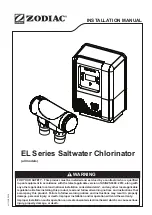
8
1. Remove the blue lock ring.
2. Insert the hose to a complete stop into the fitting.
3. Refit the lock ring.
4. Pull the hose back as a test that it is located.
Removing the tubes:
1.
Remove the blue lock ring.
2.
Push the white ring at the fitting. Now, you can remove
the tube.
3.
Please don’t forget to refit the lock ring.
Fig. 1: Tube connections
The connections are as follows (Fig. 1):
1. Tap water inlet - into the sediment pre-filter (1)
2. Concentrate outlet (waste water) at flushing valve (3)
3. Pure water (permeate) (2)
4. Tap water connection
Attach the tap connection to a 3/4" tap (cold water). If necessary, use a reduction piece (not
included in shipment).
In case of the Premium Line 300, the concentrated water flows from the outlet of the first
membrane to the inlet of the second one. There is one flushing valve at the outlet of the second
membrane housing. The outlets of the purified water are connected.
3. Starting
When all connections are tight, the water tap can be opened. The minimum water pressure for the
unit is 3 bar. The nominal capacity is reached at 4 bar. If the pressure drops below 3 bar, the
production capacity is reduced, below 2 bar it reduces also the reduction rates.
First of all, check all connections on water tightness. If leakage occurs, tighten the fittings or the
housing. Now, the concentrate flows out of the outlet (3). After some minutes, also the purified
water flows out of the permeate outlet (11), however, at a lower flow rate. The flow rate of pure
water is approx. 2.5 – 4 / 4 – 6 l/h, the flow rate of waste water is approx. 12 - 20 / 15 – 24 l/h
(at 4 bar and 15 °C). Lower pressure or temperatures reduce the pure water capacity. The pure
water produced within the first 2 hours has to be discarded because it may contain residues of
disinfection liquid which has been filled in the module for storage. After 2 hours of operation, the
water can be used.









































